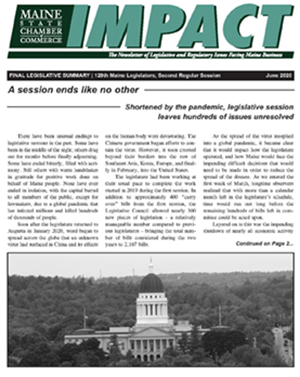|
|
|
The COVID-19
Edition for Thursday, July 9, 2020 |
To view this edition of Impact online,
click here. |
|
Welcome to
your COVID-19 Impact newsletter! |
|
|
As a valued member of
the Maine State Chamber of Commerce, we plan to stay in touch with you
several times each week through emails like this one and on Facebook and Twitter, until the pandemic passes. We
intend to provide you with the latest state and federal information, as well
as highlighting the creativity and innovation that is occuring here in Maine
during this unpredictable and rapidly changing time. To assist you in
navigating the uncertainties ahead, we have created a diverse and
comprehensive collection of web-based resources to help you take care of yourself and your family, your employees, your business, and your community. |
|
|
Do you have a question? ASK THE EXPERTS. |
We are here to
help in any way we can! |
|
Maine Department of Labor Surpasses
$1 Billion in Benefits Paid During Pandemic |
|
For the week ending July 4,
the Maine Department of Labor recorded about 2,800
initial claims filed for state unemployment insurance and 2,300 initial
claims filed for federal Pandemic Unemployment Assistance (PUA). About 62,600
weekly certifications, or continued claims, were filed last week for state
unemployment. In addition, about 24,700 weekly certifications were filed
under PUA. Weekly certifications must be filed by claimants every week in
order to continue to receive unemployment benefits. Between March 15 and July 4,
the Maine Department of Labor has paid
out about $1.03 billion in federal and state unemployment benefits. By
comparison, the Department paid out nearly $73.9 million in unemployment
benefits in 2019. From March 15 to July 4 period, the Department has handled
approximately 168,000 initial claims for the state unemployment program and
77,000 initial claims for the Pandemic Unemployment Assistance (PUA) program.
There have been about 1.6 million weekly certifications filed. Claims data is preliminary and
subject to revision. The official unemployment rate and
accompanying economic data for June will be released on July 17, which will
give a clearer picture of the state's economy. |
|
VOTE! Maine's
Primary Election is July 14 |
Your Vote Strengthens Maine's
Economy! |
|
Before each election, the
Secretary of State's office provides information about the questions
appearing on each ballot. Currently two referendum questions will appear on
the July 14, 2020, Special Referendum Election Ballot. Each question is
discussed in detail in the Maine Citizen's Guide to the
Referendum Election (PDF / Word) and a Treasurer's
Statement, which includes the
referendum questions; the legislation each question represents; a summary of
the intent and content of the legislation; an explanation of the significance
of a "yes" or "no" vote; an analysis of the debt service on the bond issues;
and, an estimate of the fiscal impact of each referendum question on state
revenues, appropriations and allocations.
|
||
|
Question
1: Bond
Issue "Do you favor a $15,000,000 bond issue to invest in high-speed internet infrastructure for unserved and underserved areas, to be used to match up to $30,000,000 in federal, private, local or other funds?" |
Question 2: Bond Issue "Do you favor a $105,000,000 bond issue for improvement of highways and bridges statewide and for multimodal facilities or equipment related to transit, freight and passenger railroads, aviation, ports, harbors, marine transportation and active transportation projects, to be used to match an estimated $275,000,000 in federal and other funds?" |
|
|
Maine DOT Commissioner: Vote "Yes" on Question
2 for Jobs, Transportation Projects In a special column to the Portland
Press Herald, Bruce Van Note, commissioner of the Maine Department of
Transportation, noted that there has never been a more important
transportation bond vote in Maine than the one to be decided this Tuesday.
Unlike past years, approval of this bond is needed to support projects that
are ready to go to construction this year. If the bond does not pass, MaineDOT will have no choice but to cut projects that
have continued to support hundreds of good-paying construction jobs at a time
when Maine needs them most. |
||
|
A YES vote on
Questions 1 and 2 - expanding broadband and |
||
|
To Fight COVID-19,
Governor Mills Strengthens Enforcement of Face Covering Requirement as Maine
Reopens |
|
In line with nearly every other state in the nation,
Governor Mills also renews Maine's State of Civil Emergency for another 30
days On Wed., July 8, Governor
Janet Mills issued an Executive Order requiring large retail businesses,
restaurants, outdoor bars, tasting rooms, and lodging establishments in
Maine's more populous cities and coastal counties to enforce
the State's face covering requirement. The Executive Order comes as Maine
continues to reopen its economy and welcome visitors from other states.
Scientific evidence demonstrates that wearing a face covering can
significantly reduce the transmission of COVID-19, helping protect the health
and safety of Maine people. Wednesday's Executive Order
strengthens that by mandating businesses require face coverings in retail
stores with more than 50,000 square feet of shopping space, restaurants,
outdoor bars or tasting rooms, and lodging establishments. It applies to
businesses in the coastal counties of Hancock, Waldo, Knox, Lincoln,
Sagadahoc, Cumberland, and York, as well as in the cities of Bangor, Brewer,
Lewiston, Auburn, and Augusta. The Executive Order focuses on these areas
given the congregation of people in Maine's larger cities as well as the
influx of tourists in destinations along Maine's coast. Under the Order,
municipalities may enforce the use of face coverings on streets and
sidewalks, in parks and other public spaces where individuals are not able to
maintain at least six feet of physical distance. |
|
The Pandemic Drove Maine Businesses to E-Commerce. Will They
Stay There? |
|
An
article in today's Mainebiz noted
that, as the Maine economy spiraled into a major downturn, some businesses
navigated their way into new or expanded e-commerce strategies and a
broader digital presence overall. Rich Brooks of flyte new media and Cameron
DeLeone of Common Wealth Poultry Co. discussed e-commerce strategies during
the pandemic in a webinar Wednesday moderated by Opus Consulting Group's
Andrew Wood. With
the pandemic, Brooks said, more companies have invested in more-robust
websites that cater to consumers online rather than face-to-face
interactions. "We're seeing that across different industries," he added. Wood
said certain retail sectors have doubled sales through e-channels. A
number of clients, Brooks added, are looking for ways to add more
functionality and visibility to their platforms. In tandem, consumers are
getting trained into behaviors to use e-commerce options - and that could
stick around long after the pandemic, he said. For example, he said,
consumers are becoming comfortable with options like delivery from smaller
stores, while previously many had viewed delivery as a service coming from
retail giants like Amazon. |
|
Understanding
Communications: Tuesday, July 14, 2020 |
|
|
In this webinar, we will discuss how
messages and marketing need to change in order to successfully connect with
target audiences. We'll look at how brain chemistry influences decision
making and simple but effective ways to communicate. Hosted by: Maine State Chamber of Commerce | Presented
by: Paula Mahony, President & Chief Strategist, Words@Work |
|
|
Additional
webinars will be forthcoming, and sponsorship
opportunities are available. Registration or general questions can be
directed to Angela Arno, director of programs and events for the Maine State
Chamber of Commerce, by emailing [email protected] or
calling (207) 623-4568, ext. 104. |
|
|
New Rules Will Delay and Prohibit Asylum Seekers from
Joining the Workforce |
|
The Trump administration has finalized two new regulations
to dramatically diminish asylum seekers' ability to work during the years it
takes for their cases to run through a backlogged immigration system. On June
26, 2020, the administration released a final rule requiring asylum
seekers to wait a full year, rather than the current 150 days, after filing
their asylum applications before they can apply for a work permit. In
addition, asylum seekers who cross or try to cross the border without
authorization after the new rule's effective date of August 25, 2020, will be
completely ineligible to ever get a work permit (with extremely limited
exceptions), despite the fact that receiving a decision from the immigration
courts can routinely take years. Comments are needed by midnight on July 15,
2020, to oppose proposed regulations that would all but gut long-standing
U.S. asylum law. Maine has more than 6,000 asylum seekers who are our
neighbors, friends, college students, coworkers, caregivers, essential workers,
and who pay taxes and contribute to keeping our population, our communities,
and our workforce vibrant. Virtually all of these
individuals would likely lose their cases and have to leave the U.S., even if
the facts of their cases merit asylum under current law, if these proposed
rule changes were to take effect. Comments can be submitted to oppose the rule and asking that it be
withdrawn in its entirety through this comment portal. The deadline
for comments is midnight on July 15, 2020. Talking points and more information
can be found online here. |
|
Maine State Chamber of Commerce Recommends Withdrawal of the
Proposed Rule to Delay and Prohibit Asylum-Seekers from Entering the Workforce |
|
The Maine State Chamber of Commerce recently submitted its comments recommending the withdrawal of a proposed rule to delay and prohibit asylum-seekers from entering the workforce. As our economy rebounds, Maine businesses will need assurances that they can meet all their workforce needs. To that end, it is crucial that they have access to talent both from Maine and other states, as well as from around the world. Policies that would, for example, impose wide-ranging bans on the entry of non-immigrant workers or impose burdensome new regulatory requirements would threaten businesses access to that talent, and hinder the economic growth and creating of jobs in Maine. No matter what sector, from health care to forestry to seafood processing, workforce shortages are a major problem. Even with the COVID-19 pandemic it is expected that Maine will not have enough available workers to drive our economy's growth. There's only one solution, and that's to make it easier for immigrants to work in this country long term, not make this more difficult. The proposed rule unfairly moves the goalposts for gaining asylum for those who already are in the middle of the process. |
|
Thursday, July 9 | The
Bottom Line Podcast |
|
|
with Mark McInerney of the Center for Workforce Research
and Information |
|
|
|
Mark McInerney, director of the
Center for Workforce Research and Information (CWRI) at the Maine Department
of Labor, was this week's special guest on The Bottom Line podcast. He joined The Bottom Line co-hosts Dana Connors
of the Maine State Chamber of Commerce and John Williams of Williams
Broadcasting to discuss the work of the CWRI during the COVID-19 pandemic as
it provides state and area labor market information to employers, job
seekers, and others. To listen to the recording of today's show,
please visit The
Bottom Line page on the Maine State Chamber's
website. In addition, The Bottom Line
podcast can be heard on iTunes, iHeart Radio, Soundcloud, Stitcher Radio,
Spotify and radio.com. |
|
Immigration Rules Could
Force Some of Maine's International College Students to Leave U.S. |
|
A recent Portland Press Herald article reported that Bowdoin College could
be hit particularly hard by new immigration rules, which prohibit
international students from staying here if
all of their classes are taken online. Federal immigration rules released
Monday have added to confusion of fall reopening plans for international
students, who are now being told by the government they cannot stay in the
United States if their course loads are fully online. The rules from U.S.
Customs and Immigration Enforcement, or ICE, state that international students
enrolled only in online programs will not be granted visas and must depart
the country or transfer to a school with in-person instruction to maintain
their legal status. |
|
Collins, King Urge
Administration to Reverse Course, Allow International Students to Remain in
America to Learn |
U.S. Senator
Susan Collins is calling for immediate reversal of student
visa rule that will cause long-lasting
harm to U.S. colleges and universities. In response to new guidance issued
earlier this week declaring that
international students must take in-person classes to remain in the United
States legally, Senator Collins urged the Department of
Homeland Security to immediately rescind this unfair and unrealistic policy. The
guidance jeopardizes the education of nearly one million international
students and affects hundreds of institutions of higher education, including
Bowdoin, Bates, Colby, and the UMaine system. In her letter
to Acting Secretary of Homeland Security Chad Wolf, Senator Collins called
for the extension of the exemption adopted on March 13 by U.S. Immigration
and Customs Enforcement (ICE) through the end of the upcoming school year.
The ICE exemption allowed international students with F-1 visas to attend
classes online while retaining their visa status.
Similarly, U.S. Senator Angus King also released a letter he sent to Acting
Secretary of Homeland Security Chad Wolf after the Trump Administration
announced it would end temporary exemptions that have permitted non-immigrant college
students who utilize F-1 and M-1 visas to remain in the
country even if their school has shifted to online learning. The decision by
Immigration and Customs Enforcement (ICE) adds yet another challenge to
schools across the country who are already seeking the best path forward
while considering the continued spread of the coronavirus across the nation,
to now worrying about students who may face deportation at schools where
learning will be completely online. In his letter, Senator King urges Acting
Secretary Wolf to consider the extension of waivers during the fall semester,
in order to allow schools to make decisions that
best fit their unique circumstances and support public health and safety. |
|
Use the Maine State Chamber's Blog and Daily
Impact to Tell Your Story! |
|
Numerous Maine companies are stepping up or
pivoting nimbly, as Maine people resourcefully address the challenges of this
pandemic. Share your perspective and experience with us and with the rest of
the business community. How are you facing and overcoming the challenges
posed by this pandemic? What are you and your employees doing in this
dramatically different economy? Tell us about the innovations your company or
employees are making or ways you have adapted your company to meet your
customers' needs. Each
blog entry should be 300 to 500 words. Join
us in creating a written history of the business community's resilience and
innovation during this extraordinary time. Please submit your entries to [email protected]. For
more information or questions, please contact Mark Ellis by emailing [email protected] or
by calling (207) 623-4568, ext. 109. |
|
MaineSpark Grants Offer
Innovative Post-Secondary Opportunities to Students Post-Pandemic |
|
In their recent contribution
to the Bangor Daily News, Wendy
Ault and Jason Judd announced the recipients
of four $5,000 MaineSpark grants totaling $20,000 to innovative
initiatives promoting postsecondary success for underrepresented student
populations. Recipients are Oxford Hills Community Education Exchange,
Project Launch, Rural Aspirations, and the University of Maine at Machias. These
awardees have initiated programs to help connect students' aspirations with
making postsecondary education a reality for them. The programs they have
launched to achieve this goal focus on increasing parent involvement in
college and career readiness, and supporting school counseling innovation,
including projects that increase the effectiveness of school counselors and
school counseling teams to address barriers to underserved populations. They
also focus on increasing business engagement in college and career readiness
through internships, mentorship programs, career days, and more. |
|
Providing Books to Maine
Students |
|
Maine educators were recently surveyed about critical needs of their students. Books were highlighted as a top priority for students of all ages. Supporting reading is essential for students to continue to thrive in schools. Making certain that our students, particularly our youngest readers, have easy access to books during the end of the school year and throughout the summer is crucial for preventing summer slide. Even with yeoman-like efforts
by Maine teachers and a hands-on approach from the Maine Department of
Education to ensure all Maine students have been able to continue learning
remotely during the pandemic, we know that learning over these past few
months has inevitably been disrupted. In addition to the school year
disruption, student achievement often widens during the summer, an outcome
referred to as summer slide. Summer slide accounts for as much as 85 percent
of the reading achievement gap between lower income students and their
middle- and upper-income peers. Providing students with appropriate books
will help address this challenge. Not only does summer reading enable
students to continue practicing foundational skills, but it opens the world
to students through stories and knowledge building around topics of interest. We need your help to ensure students across
our 16 counties have access to books, an essential commodity. Here are a few ways you can
support Maine students: 1 2020 Maine Books Challenge: Educate Maine is leading this
initiative to provide students with books while supporting local bookstores.
You can purchase an online or physical gift card at one of Maine's
independent bookstores. Every $10 donation provides a book for a Maine
student. Every donation will be matched by the Law Offices of Joe Bornstein
up to $5,000. Teachers across Maine will help coordinate book distribution to
students. If interested in supporting this effort, please email Katherine at [email protected]. 2 Scholastic Books: This company has offered significant discounts
to help get books to Maine students. For example, a $1,000 donation can
support 300 books for 100 students. A $5,000 donation can support 1,500 books
for 500 students. If interested in supporting this effort, please email Megan
Diver at [email protected]. 3 Community Book Donations: Gently used books are also needed
across Maine. We are seeking community drop off spots at local employers
throughout the 16 counties. If your business is interested in becoming a
location for books to be collected, please email Megan Diver at [email protected]. Books will be distributed to
students directly through their schools and at local meal sites throughout
the summer. Additional information about summer literacy initiatives can be
found here.
Thank you for supporting Maine students. |
|
Maine Credit Union
Launches Program to Pay Farm Closing Costs |
|
A recent story from the Associated Press / Maine Public noted that
Maine Harvest Federal Credit Union cofounder Scott Budde announced a new
program on Tuesday. The Conservation
Grant Program will pay closing costs for purchasing or refinancing
farmland in the state. The program would help borrowers to take advantage of
low interest rates by reimbursing them up to $3,500 per loan. Budde said the
program would incentivize farmers interested in buying land. |
|
|
Don't Miss the Final Legislative
Summary 2020! The outbreak of the pandemic sent many parts of
"normal" life into a tailspin. The legislative session was no exception. Now
that the dust is settling a bit, our team has assembled our annual Legislative
Final Summary. We are pleased
to present it to you here. The Final Summary represents months of
work by our team. Inside, you will find legislation that made its way
through the process and legislation whose progress was cut short by the
pandemic. We share your anxiety in coping with all the
unknowns in our personal and professional lives. However, the Maine State
Chamber is open for business. Whether we are working from the office or
remotely, we are here to help you face the
challenges ahead. Our team is up to the task and remains committed to being
the "Voice of Maine Business" in Augusta, now more than ever. |
|
To advertise in
the COVID-19
Impact, please contact Melody Rousseau |
||
|
Thank you for |
||
|
|
||
|
|
|
|
|
TO
UNSUBSCRIBE, CLICK HERE. |
NOTICE: In an ongoing effort to thwart
the activities of online hackers, the Maine State Chamber |







.png)

